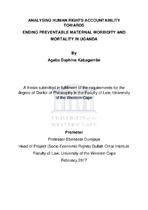| dc.description.abstract | The persistence of preventable Maternal Morbidity and Mortality (hereafter MMM), in the developing world, despite ground breaking technological and scientific advances, is unacceptable. There is no cause of death and disability for men between ages 15 and 44 that comes close to the large scale of maternal mortality and morbidity.1 Thus, the prevalence of high MMM ratios indicates the side-lining of women's rights. Surprisingly, the causal factors of preventable MMM and interventions needed to reverse the pervasively high numbers are now well known. Yet, hundreds of women continue to die daily and to suffer lifelong illnesses while giving birth. In Uganda, despite various regulatory, policy and programmatic strategies, the most recent survey revealed that the maternal mortality ratios were at a staggering 438 per 100,000 live births.2
This study attributes the continued prevalence of high MMM rates to lack of accountability that would ensure services and resources are being maximized and redistributed equitably. Lack of effective accountability mechanisms in place encourages unbridled financial, human and technical resource wastage, diversion, non-utilization and embezzlement of funds. It is not enough that medical equipment, personnel and finances are increasingly being allocated to the health sector by the Government. Without effective tracking and supervisory mechanisms, these additional financial, technical and human resource allocation will most likely not translate into reduced MMM rates.
Sadly, in Uganda, the role of accountability towards the operationalization of human rights is underappreciated. In fact, many health sector practitioners are unaware of the ways in which accountability can be implemented. Despite the recent infiltration of the term 'accountability' into laws and policies, it remains an elusive and fuzzy concept.
Further still, as demonstrated throughout the study, accountability has been popularized by international and regional human rights monitoring mechanisms such as the UN treaty bodies, African Commission but at the domestic level, great strides have yet to be made in infusing human rights accountability into laws, policies, programs and practices in a way that will reverse the high MMM. The domestication of accountability is vital because human rights ideals are only turned into actual implementable strategies at the national level. A direct focus on Uganda would allow for the undertaking of the country's own specific challenges within its domestic context. | |

